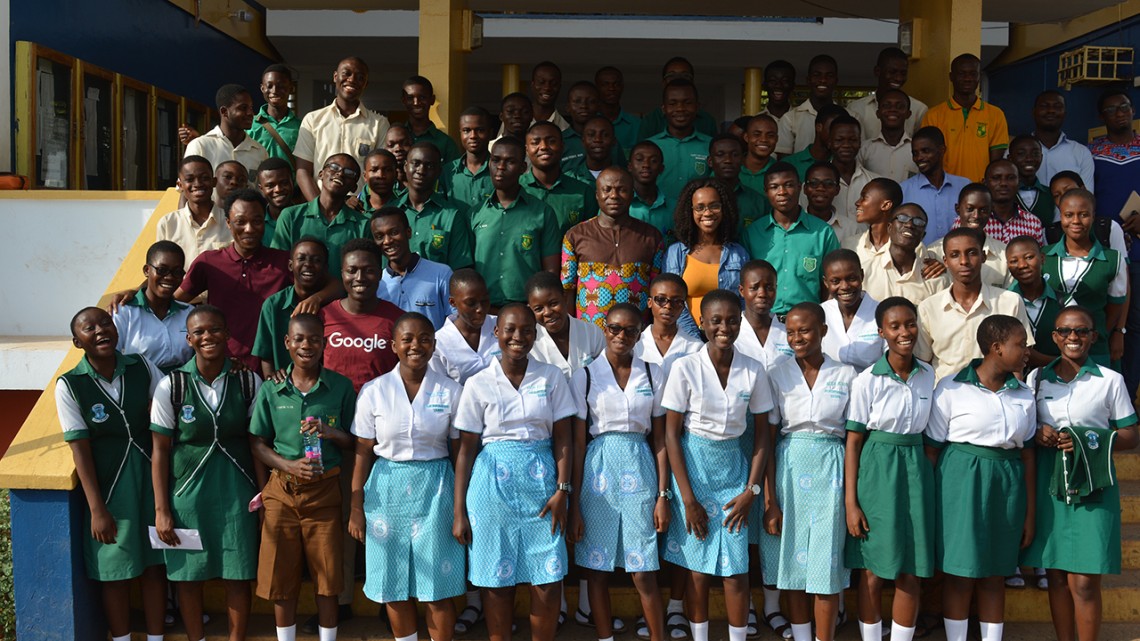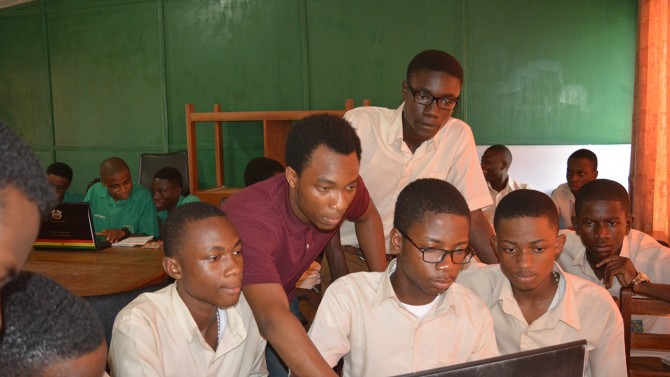
Fifty-five students from five Ghanaian high schools participated in the January 2018 coding program led by Cornell computer science students.
Students spark Ghanaian high schoolers’ interest in computer science
By Melanie Lefkowitz
Growing up, Samuel Opoku-Agyemang ’19 – like many high-performing students in his native Ghana – faced enormous pressure to become a doctor. But after spending two years of high school in South Africa, he realized computer science was his true interest and applied to study it at Cornell.
If not for those two years outside Ghana, Opoku-Agyemang might never have discovered his passion for computer science. Now, he is part of a team of students and faculty organizing a coding program to inspire interest in the field among high schoolers in Ghana, where students must choose majors before they enter university and can’t switch once they’re enrolled.
“Your parents say medical school, your teachers say medical school, so you begin to believe it is what you want,” said Opoku-Agyemang, a computer science major. “I like math, I like doing this, it makes sense. I prefer not to be in a hospital seeing blood every day – I find it so depressing.”
The project began last year, when Cynoc Boahene ’20 recruited friends and raised funds to conduct a one-day boot camp for 55 students from five Ghanaian high schools over winter break. They’re returning this January with a larger contingent of instructors, including computer science Research Professor Robbert van Renesse and Hakim Weatherspoon, associate professor of computer science, to run an expanded program, Code Afrique.
The effort will be funded in part by Computing and Information Science, Facebook, Google, the ACM Special Interest Group in Operating Systems (SIGOPS), Slack and the Tohn/Harper family. Several people have also donated laptops.
“We wanted to help our country benefit from the kind of education we’ve had here,” Boahene said. “We are the lucky ones to be able to do this. Most of us back home can’t.”
Van Renesse, who also chairs ACM SIGOPS and has organized similar programs in the United States and Asia, said little computer science research is currently conducted in Africa, indicating a large untapped potential for industry and academia.
“There are lots of people who, if only they knew that they liked computer science, they would do computer science,” he said. “If there aren’t enough people who can do this kind of thing then companies won’t move in. It’s just going to be important for Ghana, its status in the world and ability to compete, to have a good computer industry.”
Boahene came to Cornell intending to study biomedical engineering – a compromise, he thought, between his father’s wish for him to be a doctor and his own interest in physics and math. He switched to computer science after taking a Java class the summer of his first year.
“I was quite excited about this new way of thinking and solving problems,” he said.
His father came around once he learned how lucrative a computer science career could be, Boahene said.
But the student organizers said their motivation isn’t just money.
“We have our own set of unique problems in Africa, and solutions that exist in the U.S. might not necessarily apply to them,” Opoku-Agyemang said. “If more people there are empowered to solve their own problems with technology, that would work, because they live in those situations and know how to fix their problems. If they have the tools, it’s one of the most powerful things you can give them.”
The team – which also includes Sena Katako ’19, Jesse Odame Phillips ’20, Samuel Appiah Kubi of Duke University, Jessica Quaye of the Massachusetts Institute of Technology and Nana Aba Turkson of Mount Holyoke College – plans to host a total of 400 students at two two-day programs, in Kumasi and Accra. Van Renesse will also give a talk at Ashesi University. The high schoolers will spend one day learning programming and the second day participating in a hackathon, putting into practice what they’ve learned.
Around half of the undergraduate instructors will be women, to encourage girls who might otherwise see computer science as a male pursuit.
“Last year, all the students from the girls’ school were gravitating toward” Katako, the female instructor, Boahene said. “You could see them thinking, ‘I want to be like that.’ But if a male is standing there they’re thinking, ‘Maybe this is a boys’ thing.’”
Expanding the program comes with challenges. Costs include additional computers and tools, internet connection, transportation, venues, food and a Ghanaian event-planning company they hired to help manage logistics.
The organizers’ hope is that others can join or replicate their efforts and expand to other African nations.
“If people can get the chance to know that [computer science] is also an option, that medical school is not the only way, they have more information to make that decision of what to study in college,” Opoku-Agyemang said. “Knowing we were once sitting where they are, I think it was very encouraging to them when we went last time. They saw that wow, there’s so much opportunity out there through computer science. You could just see it in their eyes. That’s why this program really excites me, and it’s making a good difference.”
Anyone interested in donating computer equipment or learning more can contact info@codeafrique.com.
Media Contact
Get Cornell news delivered right to your inbox.
Subscribe

